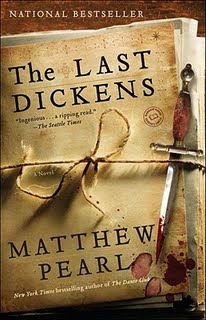Click here to read Matthew's guest post, The Last Dickens and the Exciting History (Really!) of the Publishing Industry.
 ReadingGroupGuides.com: You've met with many reading groups to talk about your three novels --- The Dante Club, The Poe Shadow and The Last Dickens. What do you enjoy most about interacting with book clubs?
ReadingGroupGuides.com: You've met with many reading groups to talk about your three novels --- The Dante Club, The Poe Shadow and The Last Dickens. What do you enjoy most about interacting with book clubs?Matthew Pearl: Book club conversations are such treats. I've always believed in books as means to a community, as played out in the stories of my novels, too. The Dante Club, my first novel, was in a way actually about a nineteenth century book club. The Last Dickens, too, is about the passion that books inspire and the way books can empower or endanger readers.
RGG: Why do you think classic literary figures have such continuing appeal for modern readers? What about Charles Dickens in particular?
MP: So many of us grew up reading about classic literary figures without knowing much about them. Historical fiction allows us to explore classic authors beyond their famous names. Dickens is a great example of this. His identity as a writer is very different from his personal identity, and this is something I have the chance to explore in The Last Dickens.
RGG: What research did you do for The Last Dickens?
MP: There were many different areas of research, from the very large --- Charles Dickens as a person --- to the very small --- what clothing the character of Rebecca would wear. I actually love the research, which is important, because it can get very tedious. This was the first novel where I hired a research assistant, who was a wonderful help.
RGG: You've taken on two of literary history’s most tantalizing mysteries --- whether or not Dickens completed his final novel and, in The Poe Shadow, what led to Edgar Allan Poe's unexplained death. How much of your talks with reading groups center on the mystery aspect of the plots? What other themes and topics do they particularly like to discuss from your novels?
MP: Reading groups often enjoy speaking about what parts of the novels are fact and what are fiction. That's especially the case with Poe's death and Dickens' final plot. With The Last Dickens, some reading groups also read The Mystery of Edwin Drood in conjunction with the novel. The character of Rebecca and the particular challenges for a young woman working in an office in the 19th century also seems to be an interesting topic.
RGG: What one or two memorable book club moments can you share with us?
MP: Well, I've had some questions about setting me up with some book club members' daughters or grandaughters, which I appreciate, though probably my wife doesn't! The book club meetings I've attended in person instead of on the phone clue me in to the real secret of the book club: great food. For my book party for The Last Dickens, the restaurant recreated a dish called Timbales a la Dickens and a drink called Dickens punch. I'm happy to share the recipes if any book clubs want to combine that with discussing the novel.

